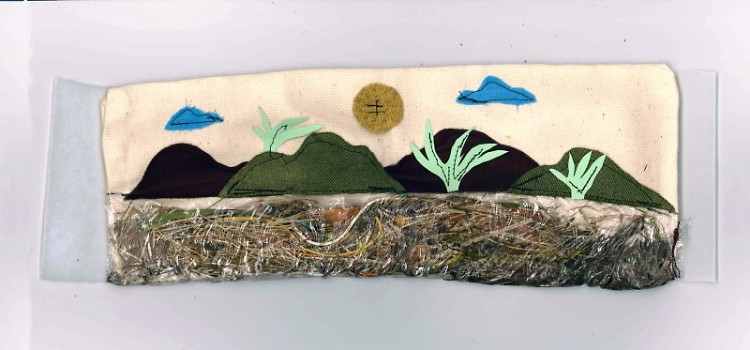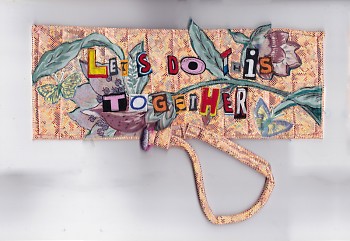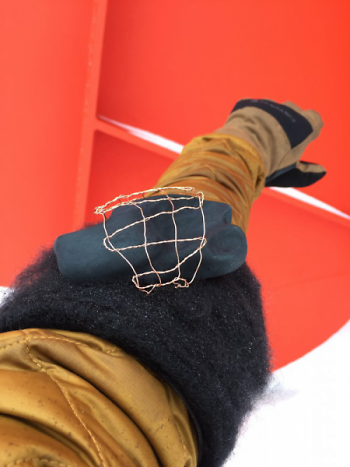Created to provide greater access to public art, Flex Gallery is a wearable, rotating exhibition space located on curator Zachary Trebellas' left arm. The mobile art space has to date hosted twenty-one custom armbands created by local, regional, and international artists that were exhibited in runs of two weeks each. Flex Gallery is curated with no limitations other than the dimensions of the canvas armbands which Trebellas supplies to each artist.
To commemorate the recent end of its fourth season, I’ve asked each participating artist two questions about art. Here are their responses.
Zachary Trebellas: What are some ways that making art improves your life?
EJ Cobb (EJ): In every possible way! Because of this interest in art...that I've had for most of my life, I've been able to connect to so many interesting ideas and...wonderful people. I know I would not feel so fulfilled without having that in my life. It has also allowed me to approach my life and worldview very differently than I would have otherwise. I am not afraid of having unanswered questions. I'm not afraid of failing. Making art allows me a lot of extra wiggle room in just dealing with myself and my ideas that gives me the freedom to explore the wild and wacky and unnerving and confusing without feeling obligated to also explain everything that is going on. I end up having a very intimate knowledge of open-endedness, and I really like not always having the answers. I like being able to say "I don't know why and that's ok" because sometimes that's just the way life is.
Ryan Wyrick (RW): Creating and art making is a constant source of empowerment for me and is a tool I use to constantly (even if it feels like a slow process at times) improve myself and how I exist. I...make work that shares my story while also being affirming and use it as a tool to elevate myself, even when the work expresses grief and hardship. Creating has become a fundamental instrument in how I interact with myself, and often how I get through impasses I find myself stuck in.
Megan Galvin (MG): Art for me is a way to explore the unknown, which is an important part of both my artistic and personal practice (which are very interdependent.) Art is a way that I go into new territory, and imagine new ways of being, and I think a lot of artists are doing that. There is value in being able to navigate, or even just be comfortable in those uncertain places.\
Amber Bledsoe (AB): Making art ultimately acts as a form of meditation for me. Creating keeps my hands busy and quiets all the thoughts in my head that cause me anxiety. Beyond that it becomes a way to question the world, experiment with thought and material, and share my experiences with others. When I decided that I wanted to pursue being an artist, everything in my life just clicked into place. I was happier and I was meeting new friends in workshops, residencies, classes, and exhibitions. Most of the people I surround myself with are artists, makers, or art lovers. Making art helped me find my people.
ZT: What is something you wish the general public knew about art or artists?
EJ: Being an artist is not easy. That's a huge thing for me. When I think back to...high school, there was this idea that Art was an easy class, that you could just fudge things and get an A or that it would all be fun and games and it would be a way to slack off and still keep your GPA up. Even outside of school, there seems to be that attitude, that artists are these romantic creatures without a care in the world that have no obligation to acknowledge acceptable social practices or to be responsible for the decisions they make and they float through life painting pretty pictures. It's simply not true. I have to work a normal job and make a budget just like everyone else. If I want to be taken seriously, I have to find a way to share my ideas in a way that is digestible. If I want my work to be noticed, I have to present it in a way that is professional. If I have a project in mind, I have to specifically set aside the time and money to make it happen, and I have to plan my schedule out accordingly, just like anyone else would. I have to know a little bit about everything I do or am inspired by. It's not all history and technique, there's philosophy and physics and geometry and skilled manual labor and math and religion and politics and the list goes on and on. If I want to talk about it, I have to know what I'm saying. And I have to be ok knowing that it might not work! It's a lot of work, both mentally and physically, but I would add that it is also worth it. When it works, it's definitely worth it.
RW: I do believe that a lot of artists feel cast out. (On a variety of levels, within family, within society, etc) We live in a time where it's easy to support art by propagating likes and kind comments, or even buying work, which are crucial in a capitalistic society. However, people seldom support artists and their intrinsic values beyond the physical art. I suppose I wish the general public new that they could create systems of support that elevated the artist, and not just the art.
MG: I wish people knew that there are so many ways to make meaningful connections in this world, and I think most people are on artistic inquiries without even knowing it because "art" and "artist" have kind of become exclusive terms. Anyone who wants to can be an artist.
AB: I wish the public knew that artists never stop working. We are always looking, planning, dreaming, and making. We take in everything around us, our relationships and conversations, what’s happening in the world, the details found on the sidewalk and in every building we pass. All of it. Our entire lives and environment affect us and I think most people see us sitting and sketching and think to themselves, “It would be nice to just relax and doodle all day,” but they don’t realize that we are working. It’s hard work being a creative and never being able to turn it off, but it is also invigorating.
Flex Gallery was exhibited at the UICA in summer of 2017 and has been featured in Hyperallergic and Temporary Art Review. Its fifth season will run from January through April 2020.
The Rapidian, a program of the 501(c)3 nonprofit Community Media Center, relies on the community’s support to help cover the cost of training reporters and publishing content.
We need your help.
If each of our readers and content creators who values this community platform help support its creation and maintenance, The Rapidian can continue to educate and facilitate a conversation around issues for years to come.
Please support The Rapidian and make a contribution today.


